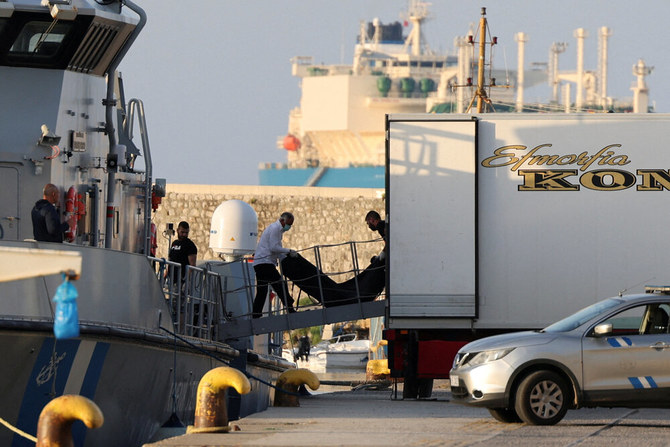
- ARAB NEWS
- 18 Jul 2025

RAMALLAH: Palestinians were among the migrants whose boat sank in deep waters about 50 miles from the Greek coastal town of Pylos on Wednesday.
At least 80 migrants lost their lives in the shipwreck. Rescuers scoured the seas off Greece on Thursday as hopes of survivors dwindled and fears grew that hundreds more, including children, may have drowned inside the crowded fishing vessel’s hold.
Reports suggest that between 400 and 750 people had packed the fishing boat, which departed the Libyan port of Tobruk and capsized and sank early in the morning.
Greek authorities said 104 survivors had been brought ashore.
The past few weeks have seen a significant increase in drowning incidents involving Palestinians, leading to demands for answers from the ruling Palestinian Authority in the West Bank and Hamas in the Gaza Strip.
Both the PA and Hamas are responsible for tracking these incidents and communicating with victims’ families and relevant authorities in countries where the tragedies occur.
On nearly a weekly basis, boats carrying Palestinian immigrants from the shores of Libya, Tunisia, Morocco, or Turkiye have sunk, claiming several lives.
Palestinians call them ‘death boats,’ and they often carry children on journeys with no guarantee of safety.
Palestinian sources who spoke to Arab News reported the testimonies of survivors who say that smugglers, looking to maximize the number of passengers on the rubber boats, allow twice the recommended number of people onboard.
The boats are meant to be powered by two engines, but smugglers keep only one functional in order to save fuel.
One of the passengers, with no prior experience in dealing with high winds and other dangers, is given brief training in operating the boat and determining the direction.
Ambassador Ahmad Al-Deek, a political adviser at the Palestinian Foreign Ministry, told Arab News that it was challenging to know the exact number of Palestinians who lost their lives in Wednesday’s tragedy as some went missing and others were arrested by Greek or Italian coast guards who did not cooperate with the Palestinian embassies.
Al-Deek said that the Palestinian migrants, some of whom come from the Gaza Strip while others come from Syria and Lebanon, embark on a dangerous journey to reach the Greek shores, paying smugglers between $7,000 and $10,000. The smugglers transport them in old, rickety boats that have a capacity of 10 but are loaded with 40 to 50 passengers. All these factors contribute to their sinking, he said.
If the smuggling gangs have an argument with the passengers, he added, they sink the boat on purpose. Most such boats depart from Turkiye or Libya.
Al-Deek said: “Organized gangs of human traffickers are behind this humanitarian tragedy. We are working to make it a Palestinian public opinion issue, where Palestinian families should prevent their children from embarking on such journeys of death.”
Despite appeals to Palestinian families to warn their children against falling victim to smuggling gangs, the phenomenon continues, Al-Deek said.
According to the testimonies of survivors, smugglers avoid disclosing sinking incidents for several days, and passengers are sometimes harshly beaten and abused. They also face cruelty when they are intercepted by Greek security patrols who receive them on the islands they reach.
“We are working day and night to limit this ongoing disaster, and we have asked the Palestinian embassies in the countries where Palestinians depart from to discourage the youths from doing that,” Al-Deek said.
He said that a special department has been set up in his ministry tasked with collecting information about those missing and communicating with their families and the authorities, Palestinian embassies, and coast guard police of the countries where the incidents occur.
“Its task includes cooperating with the Palestinian intelligence service in collecting information about the victims and the gangs responsible for the tragedies, communicating with those who are arrested in the investigation and shelter centers, reassuring their families about their conditions, and helping those families who want to bring home the bodies of their children,” Al-Deek said.
“Palestinian youths, under pressure to make a living, decide to board these boats. Therefore, there is a need to lift the siege on Gaza and improve the living conditions of young people there,” he added.
Hamas claims it is educating citizens in Gaza through Friday sermons in mosques and radio and television talks, urging them not to take part in these perilous trips and asking many Arab and non-Arab countries to absorb the graduates of Gaza universities in their job markets.
Mukhaimer Abu Saada, a professor of political science at Al-Azhar University in Gaza, told Arab News that economic reasons were driving young men in their 20s to migrate via boats, pointing to the high rate of unemployment and the lack of job opportunities among university graduates in the Gaza Strip.
“The unemployment rate among youths in the Gaza Strip has reached 45 percent, and the unemployment rate among university graduates 65 percent,” Abu Saada said.
“Most government jobs in Gaza are taken up by members of the Hamas movement,” he said, noting that the UN agency UNRWA, which is considered the second top employer after Hamas, has reduced its vacancies and now employs daily wagers or hires people on annual contracts.
The PA stopped hiring university graduates from Gaza in 2007, and obtaining work permits in Israel is complex.
Around 2 million people live in Gaza Strip, which has been under a comprehensive Israeli blockade since 2006.